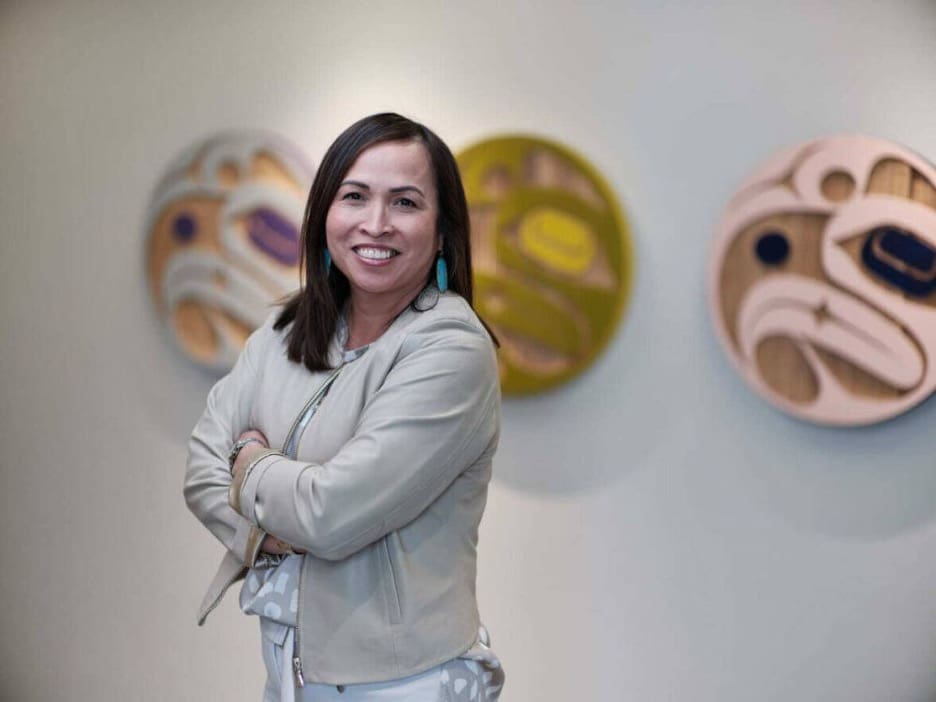It’s clear that governments and enterprises ahead of the global transition are not just stepping up—they’re making strides towards impactful change in social, environmental, and economic spheres. A long-term strategy for these areas are recurring agenda items at the executive and board tables, and the intersection of these priorities is creating a dynamic ripple effect across leading forums.
Canada is positioned to lead this paradigm shift, supported by ethically-conscious investors and consumers demanding responsible sourcing and production practices that honor human rights and environmental sustainability. At the core of Canada’s advantage point are First Nations, whose involvement is critical in the necessary leaps and bounds given the 2050 timeline to establish a just, equitable, and resilient framework.
With the 7th FNMPC annual conference approaching, we spotlight Jolain Foster, Managing Partner, Nation Building, Deloitte, whose journey reflects a deep commitment to these principles and whose leadership exemplifies the integration of these imperatives into business praxis.

Question: What personal experiences from your community have been the driving force of your commitment to Indigenous participation and reconciliation, ultimately leading the nation-building advisory at Deloitte?
I grew up in Hazelton, B.C., a member of the Gitxsan Nation, and I experienced poverty all around me, even though my Nation was rich with natural resources like forestry, water, fish, and critical minerals. This experience ignited my passion for leading transformational change —not just for my Nation, but for all Nations who share the same history. I knew this needed me to gain a deeper understanding of educational institutions, government, and resource development corporations and how they operate to begin building a bridge between our Nations and the rest of Canada. Over the last 25 years I’ve pursued my personal purpose by working with First Nations directly and indirectly in universities, governments, and global corporations. And now, I’m so excited to have the support, scale and experience of Canada’s largest professional services firm, where I can truly scale my ability to have impact through my managing partner role at Deloitte.
Question: How have large international corporations such as Deloitte been supporting the conversation around Indigenous participation?
Deloitte developed and published corporate Canada’s first Reconciliation Action Plan (RAP) in 2020 and engaged with hundreds of Indigenous Nations and Peoples to develop a deeper understanding of what’s required to help deliver holistic solutions to their signature issues. To build on our RAP we recently launched Nation Building, our new Indigenous-led approach that will serve those who play a critical role in creating economic empowerment for First Nations and Peoples: the Nations themselves, non-Indigenous governments, and corporate Canada. Together we can ensure that Indigenous Peoples and Nations play a leading role in the economy, propelling Indigenous businesses forward while advancing reconciliation efforts.
Question: What inspired you to partner with the First Nations Major Projects Coalition and take on the role as co-host to the upcoming 7th FNMPC Annual Conference, Our Collective Advantage: Indigenous Consent?
My life’s purpose is to create new paths for economic wealth for First Nations and Peoples – working to eliminate poverty, and improve governance and operations. That’s what it means for me to make an impact that matters. I want to be at the heart of collaboration between corporations, governments, and Nations to address their signature issues and find innovative solutions. It isn’t easy, but the FNMPC Conference brings us all together to have both the inspiring and the difficult conversations needed to build a stronger understanding of the importance of Indigenous consent in developing resources in this country. I couldn’t be more thrilled to co-host and elevate the need for transformational change.
Question: Which conversations are you looking forward to most in April at the conference and which speakers are you interested in hearing from?
I’m excited for the discussion and differing perspectives on the Ring of Fire and how mining in Canada can be reimagined to support First Nations’ self-determination goals and aspirations. I’m also really interested in hearing from the Maori thought leaders who have developed a New Zealand International Sustainability Standards Board (ISSB) implementation strategy that demonstrates a wider understanding of impacts beyond monetary perspectives.
This year’s conference will host Indigenous, industry, and government leaders across North America, to explore how Indigenous rights, included in UNDRIP-driven Indigenous-industry partnerships, is driving commercial success that benefits all. To guide the discussions, the conference will be co-hosted by Mark Podlasly, Chief Sustainability Officer at FNMPC, and Jolain Foster, Managing Partner of Nation Building at Deloitte. Together with other esteemed speakers, they will engage in critical discussions on Indigenous-led project governance, UNDRIP implementation, environmental stewardship, and the transformative role of Indigenous consent in the sectors leading the environmental and economic transition.
